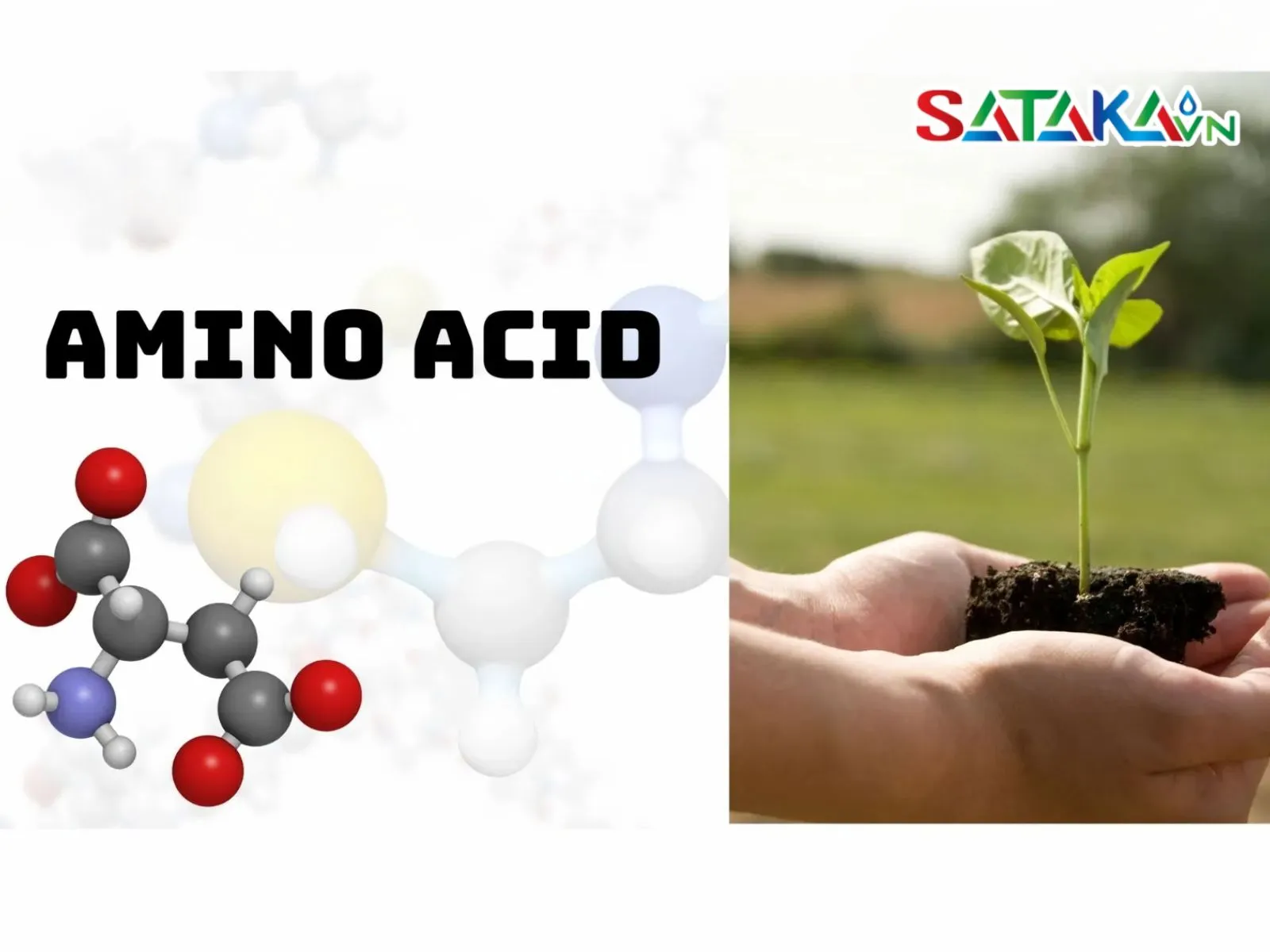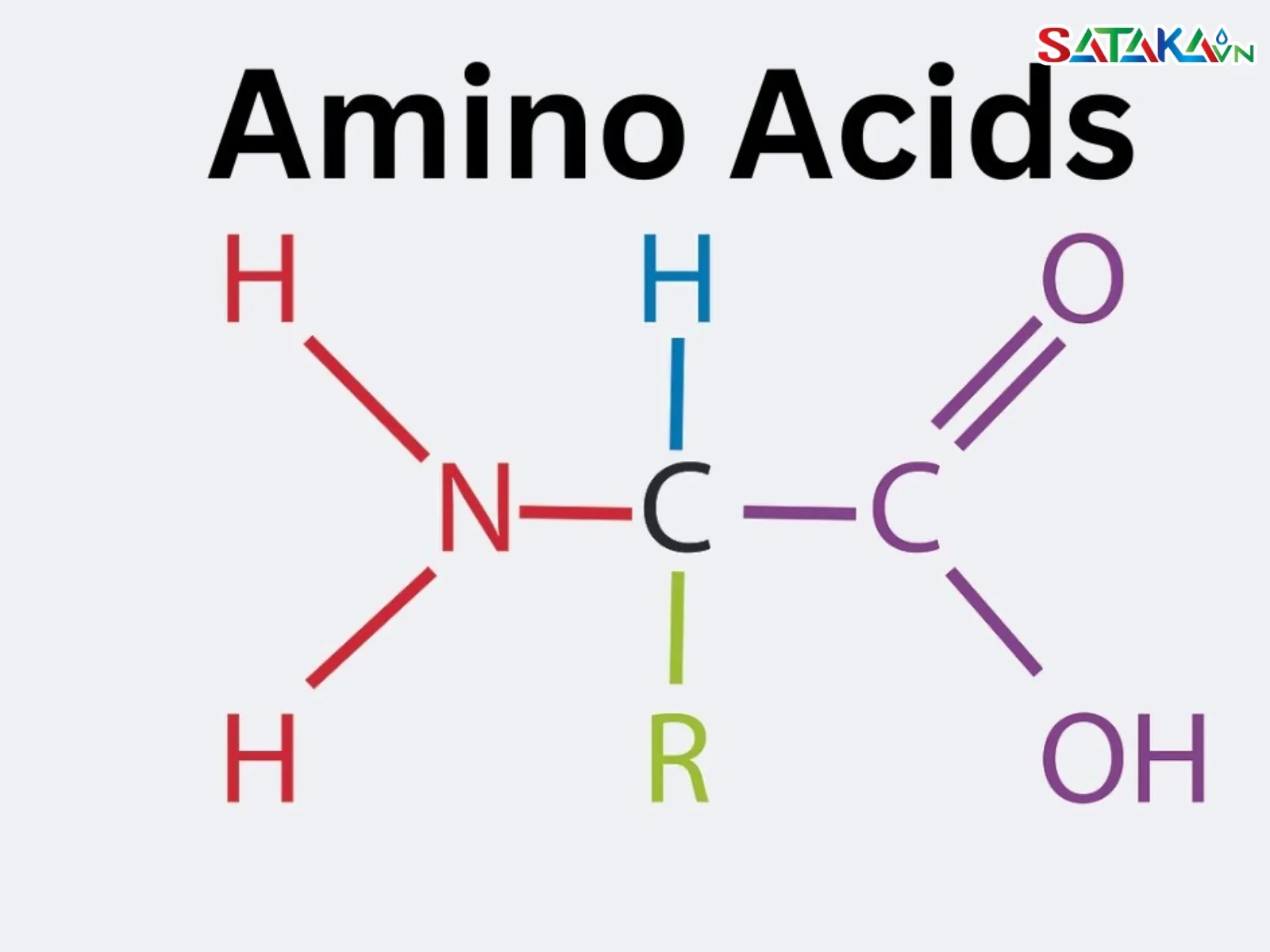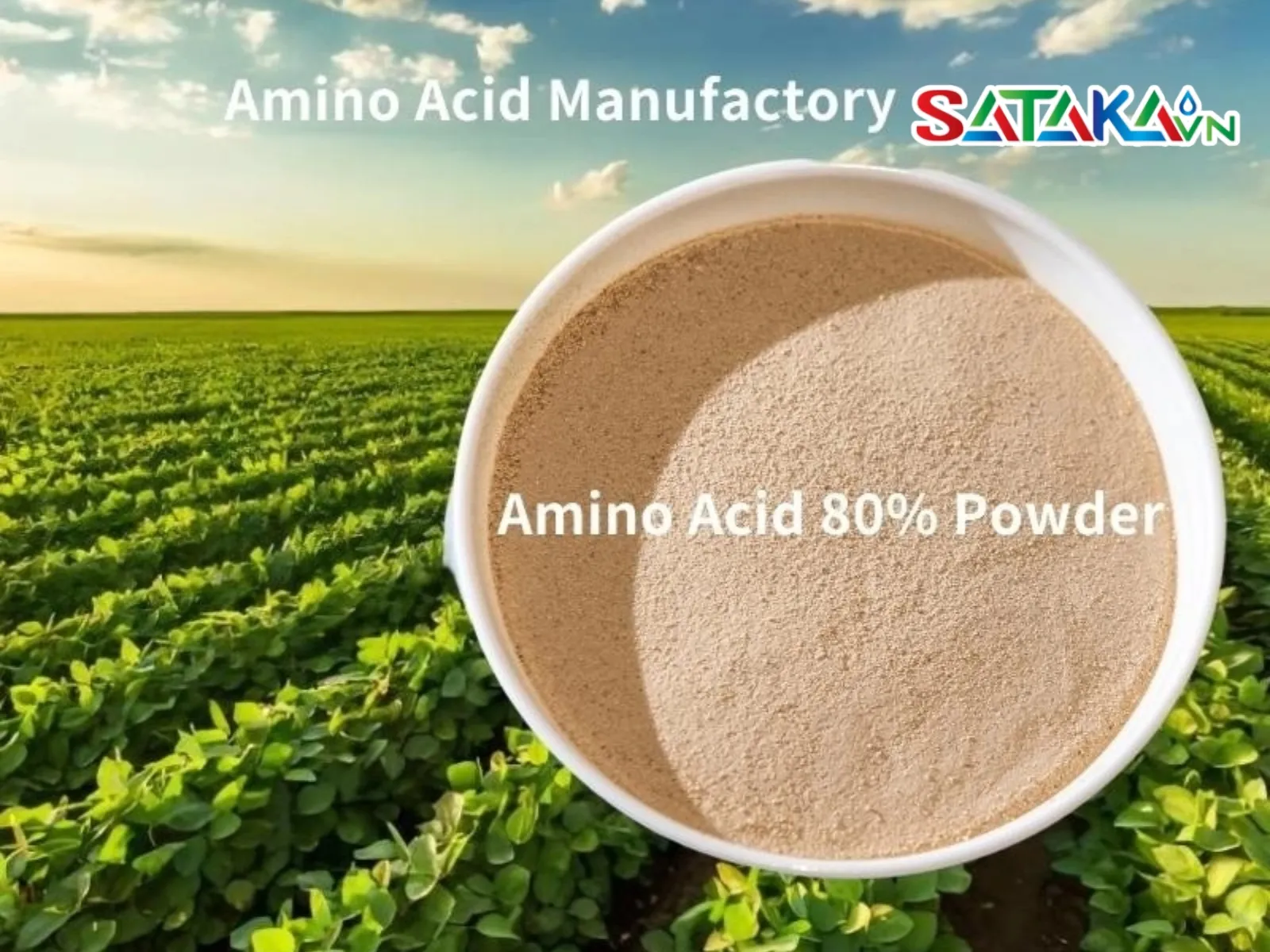Discover the role of amino acids in agriculture with the best quality from Sataka. Enhance crop development and improve productivity effectively
The Role of Amino Acids
The use of amino acids in agriculture has become an effective solution for improving crop yield and quality. Amino acids, as the building blocks of proteins, not only help plants grow more robustly but also enhance their resilience to adverse conditions. In this article, Sataka Corporation will introduce the roles, advantages, and limitations of amino acids in agriculture.
1. What Are Amino Acids?
Amino acids, also known as amino acids, are organic compounds consisting of amino groups (-NH₂) and carboxyl groups (-COOH) combined with a specific side chain. The chemical formula of an amino acid is H₂NCHRCOOH. In nature, amino acids play an essential role in life processes, from building proteins to other critical biological functions. They are the fundamental "building blocks" of all proteins, which are indispensable in the structure and function of living cells.

Amino Acid helps plants grow lush and green
In agriculture, amino acids are used to enhance plant growth and improve the quality of agricultural products. Research has shown that amino acids in agriculture not only promote vigorous plant development but also strengthen their resistance to stress factors.
2. The Roles of Amino Acids in Agriculture
2.1 Fundamental Building Blocks
Amino acids are the basic units that make up proteins, a foundational component essential for plant life. Proteins are crucial in all physiological activities of plants, including photosynthesis, respiration, nutrient transport, and plant defense systems.
- Photosynthesis: Proteins play a vital role in absorbing light and converting light energy into chemical energy, enabling plants to produce food and oxygen essential for life.
- Respiration: Proteins assist in the respiration process, helping plants convert energy from nutrients into usable energy for growth and development.
- Nutrient Transport: Proteins are critical in transporting water and nutrients from the soil into the plant and distributing them among its parts, maintaining nutrient balance and plant health.
- Defense Systems: Plants use proteins to develop enzymes and antibodies that help combat pathogens and pests.

Basic structures of Amino Acids
2.2 Enhancing Growth and Development
Amino acids play a key role in promoting plant growth and development by:
- Stimulating Cell Division: Amino acids encourage cell division, increasing plant mass and size. Enhanced cell division leads to faster growth and optimal plant size.
- Improving Nutrient Absorption and Transport: Amino acids enhance the plant's ability to absorb nutrients from the soil and distribute them to other parts of the plant.
- Root Stimulation: Amino acids promote root development, enabling plants to anchor firmly in the soil and absorb water and nutrients more effectively. A strong root system forms the foundation for sustainable plant growth.

2.3 Increasing Yield and Quality
Amino acids significantly contribute to boosting crop yield and quality by:
- Increasing Fruit and Seed Set Rates: Supplementing amino acids can improve fruit and seed set rates.
- Enhancing Agricultural Product Quality: Amino acids enhance the quality of agricultural products by increasing sugar and vitamin content in fruits and seeds. They also improve firmness and enhance the color of produce, making it more attractive in the market.
- Improving Resilience to Adverse Conditions: Amino acids help plants better withstand environmental stresses such as drought, flooding, and pests. By enhancing plant resilience, amino acids maintain yield and quality even in challenging conditions.

Amino acids help fruits and seeds increase fruit set rate and productivity
2.4 Strengthening Plant Immunity
Amino acids are essential for strengthening plant immunity, helping plants resist harmful factors and recover quickly. Specifically:
- Boosting the Immune System: Amino acids enhance the plant's immune system, enabling it to fight off bacterial and fungal infections.
- Supporting Recovery After Pest Attacks: When plants are affected by pests or adverse conditions, amino acids aid in the recovery process.

Amino acids help strengthen the immune system of green plants
2.5 Special Roles During Key Growth Stages
Amino acids have distinct effects during critical growth stages, optimizing yield and product quality:
- Flowering and Fruit Set Stage: Amino acids increase pollination and fruit set rates, supporting the uniform and healthy development of fruits. This ensures higher fruit set rates and evenly developed fruits, crucial for yield and quality.
- Fruit Development Stage: Amino acids accelerate fruit growth and increase sugar and vitamin content, improving both quality and nutritional value. Larger, nutrient-rich fruits benefit both consumers and producers.
- Ripening Stage: Amino acids promote uniform ripening, enhance fruit color, and improve flavor. Using amino acids at this stage not only enhances the visual appeal of the produce but also boosts its flavor, increasing market value and consumer satisfaction.

Orange fruits ripen evenly thanks in part to Amino Acids
3. Advantages and Limitations of Using Amino Acids in Agriculture
3.1 Advantages
- Quick and Visible Effects: One of the standout benefits of amino acids in agriculture is their ability to produce rapid and noticeable results. Plants often respond quickly to amino acid supplementation, showing significant improvements in growth, yield, and quality in a short period.
- Safe for Humans and the Environment: Amino acids are considered safer for humans and the environment compared to many chemical agricultural inputs. They are less toxic and do not accumulate in the soil, minimizing pollution risks and protecting worker health and the surrounding ecosystem.
- Enhance Fertilizer and Pesticide Efficiency: Amino acids improve the effectiveness of fertilizers and pesticides by enhancing nutrient and pesticide absorption, increasing the efficiency of agricultural practices.
3.2 Limitations
- High Cost: The primary limitation is the higher cost of amino acids compared to other agricultural products, which may increase production expenses, especially for small-scale farmers or those with limited budgets.
- Requires Proper Dosage and Application: To achieve maximum benefits, amino acids must be applied at the correct dosage and using the appropriate method. Improper application may lead to suboptimal results and wasted resources.
4. Where to Buy Quality Amino Acids at Competitive Prices
Sataka Corporation is a leading provider of chemicals, raw materials, and agricultural input solutions. With years of experience, Sataka has built a reputation for delivering high-quality products and dedicated services.
- Quality Products: Sataka offers high-quality amino acids, rigorously tested to ensure optimal effectiveness for crops. These products significantly boost crop yield and quality.
- Competitive Prices: Sataka is committed to providing competitively priced products. The company understands the importance of affordability for farmers and agricultural businesses and strives to offer the best prices without compromising quality.
- Dedicated Customer Service: Sataka not only supplies products but also provides professional and attentive customer service. Their team is ready to advise and support customers in selecting the most suitable products for their needs.
- Safety and Quality Assurance: All Sataka products are thoroughly tested to meet quality and safety standards, ensuring they are safe for crops and the environment.

Amino Acid products are sold at Sataka Joint Stock Company
Amino acids in agriculture bring numerous benefits, from enhancing growth and development, boosting yield and quality, to improving plant resilience. Although there are limitations, such as high costs and the need for proper application, using amino acids correctly can help you achieve optimal results in farming.
When looking for reliable amino acids for agriculture, Sataka is a trusted choice, offering quality products, competitive prices, and excellent service. Contact Sataka now at hotline 0856555585 for prompt consultation and support!






